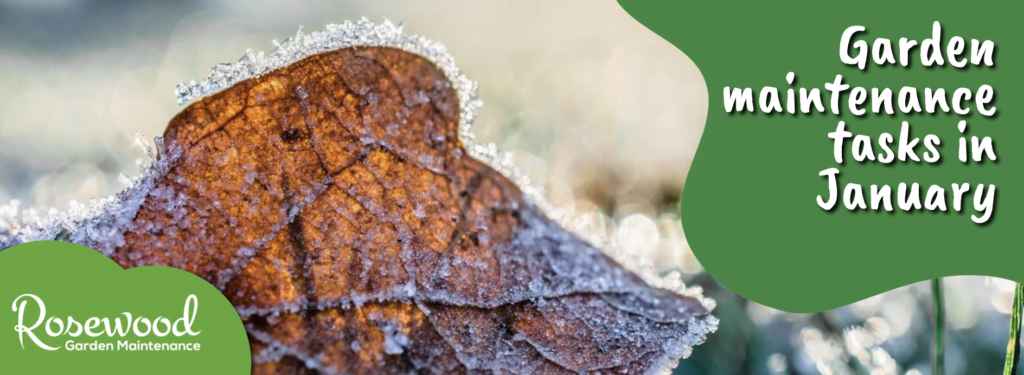
The festive period is over, the weather is getting colder and a brand new year is here! You may be thinking your days in the garden are over until the Spring, but there is plenty to be getting on with in preparation! Read on to find out our top 5 garden maintenance tasks in January.
Garden maintenance in the winter
January is a great time to take stock and start planning for the year ahead. It’s also the perfect time to take a closer look at your garden and start your preparations for the gardening year!
Maybe it’s time for a complete garden overhaul or perhaps it just needs tidying up a little? Whatever your plans are to make your garden the best it can be for the warmer months, make sure to enlist the help of a professional garden maintenance company, which can guarantee a high-quality service every time.


Recycle your Christmas tree
Your Christmas tree may have been lying around in the garden for a couple of weeks now. If you haven’t moved it already, now is the time! There are two options when it comes to getting rid of your tree;
You can take it to your local recycling centre where it can be recycled into wood chips, these are then used in local parks and green spaces. Some local councils also offer a collection service, meaning the hard work is being done for you!
Did you know? Christmas trees provide fantastic mulch for your garden, so if you want your space to benefit, we suggest you hold on to it. If you have access to a shredder, simply shred the tree and spread it across your plant beds.
The mulch will help boost the fertility and structure of your soil, suppress weeds and conserve moisture, creating a layer of protection for your growing plants and shrubs over the harsh winter months.


Prepare your pots ready for the spring
January is a great time to get things ready for the growing season, as when it does come around you’ll want to be able to maximise the time you have tending to your plants, rather than cleaning.
It’s important to keep your pots clean and remove salt deposits, which can form on the bottom of pots if water is allowed to sit. Salt deposits can affect any new plants you put in them as it can damage the water quality.
Cleaning is also important to prevent spreading disease. Whilst one plant may survive happily with a certain type of disease, it could be disastrous for another, so it’s vital to make sure new plants are planted in nice clean pots.
To clean plant pots, scrub off the salt deposits and excess soil with a stiff hand brush and clean, warm water. Don’t use soap, though, as it may cause harm to your new plants.
To remove any bacteria, spray plastic pots with bleach. Terracotta pots are best soaked in bleach for about 20 minutes and then allowed to dry naturally.


Dig over borders in preparation for spring
When it comes to general garden maintenance, one of the most important tasks is giving your borders some much-needed attention.
Take your time with this and make sure you have a good quality spade and/or fork as it can be hard work digging over your borders. The earlier in January you can do this task, the better.
Whilst digging over your beds, why not use the opportunity to add in some fertiliser or lime to improve the quality of your soil? Soil cultivation will improve the structure of your soil and help to bury any weeds and debris, all ready for spring.
Remove worm casts from your lawn
Worm casts can be the bane of your life if your lawn suffers from this frustrating pest! Worm casts are caused by earthworms and typically appear on the surface of your lawn as small mounds of soil.
The activity of earthworms is welcome for plant beds, but in the case of garden lawns, it can really ruin their appearance.
Worm casts can be broken up using a garden rake, but this can only be done when the soil is dry and unfortunately, in January, there are very few days when your lawn will be dry enough to carry out this task.
One of the issues with real grass is that it’s generally unusable during the winter months. Walking on saturated grass will damage it.
There is a range of chemical products available to help you deal with worm casts. They normally contain sulphur, which helps to alter the pH level of your lawn to a more acidic level, which earthworms generally don’t like.
As always when using any form of chemical, carefully read the label before applying it and remember you may need to keep pets and children away from the treated areas.


Garden maintenance services in preparation for spring
There are lots to be getting on with this month, and before you know it the spring bulbs you planted will be emerging from the soil, signalling the start of warmer days. If you’ve got big plans for your garden and perhaps need a little help, we offer a range of garden maintenance services within Surrey. Please give our team a call on 07393 821797 or click here to get in touch.






